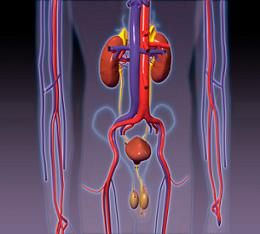
Chronic kidney disease, also called chronic kidney failure, describes the gradual loss of kidney function. Your kidneys filter wastes and excess fluids from your blood, which are then excreted in your urine. When chronic kidney disease reaches an advanced stage, dangerous levels of fluid, electrolytes and wastes can build up in your body
The cause of chronic kidney disease isn’t always known. But any condition or disease that damages blood vessels or other structures in the kidneys can lead to kidney disease. The most common causes of chronic kidney disease are diabetes and high blood pressure.
So what are the diet and supplement recommendations for dealing with kidney disease. In this post from the Life Extension Blog, they talk about kidney disease and some of the options available:
“Diet and Supplement Options for Kidney Disease
http://blog.lifeextension.com/2017/12/diet-and-supplement-options-for-kidney.htmlThe kidneys consist of two organs situated on either side of the body, below the ribs. Among other functions, the kidneys filter.the blood, a function that is vital to life. Kidney disease occurs when the organs’ ability to filter wastes from the blood becomes impaired, leading to an elevation of harmful compounds. Kidney failure is sometimes diagnosed as acute, which requires immediate intensive treatment and is usually reversible. Chronic renal failure (CRF), on the other hand, can develop over time and, in the absence of a kidney transplant, requires a lifetime of treatment. Other than dialysis or a transplant, can anything be done for kidney disease?
Supplements
A study reported in Diabetes Care demonstrated improvement in the kidney function of type 1 diabetics who received orally administered vitamin E, as indicated by normalization of the kidneys’ ability to clear the waste product creatinine.1 Elevated creatinine is a hallmark of kidney disease.
B-Vitamins
In diabetic rats, thiamine and benfotiamine (forms of vitamin B1) inhibited the development of microalbuminuria (increased albumin in the urine, another indicator of diseased kidneys) by 70%–80% in comparison with animals that did not receive the vitamin.2 Authors R. Babaei-Jadidi and colleagues proposed that, “Clinical diabetic subjects should avoid becoming thiamine deficient, even weakly so, and that high-dose thiamine repletion should be considered for therapy to prevent the development of clinical diabetic nephropathy.”
Vitamin B6 may also play a protective role in the kidneys. In a double-blind trial, researchers assigned 317 diabetics who had protein in their urine to receive a placebo or one of two doses of the vitamin B6 derivative pyridoxamine dihydrochloride twice per day for a year.3 Among participants whose initial serum creatinine levels were among the lowest third (which indicates less advanced kidney dysfunction), treatment with the higher dose of pyridoxamine hydrochloride was associated with half the rise in creatinine levels over the course of the study in comparison with the placebo, which suggests that the compound could slow the progression of less advanced disease.
Another B vitamin, folic acid, was shown to delay the progression of chronic kidney disease in hypertensive men and women treated with the blood pressure drug enalapril.4 Among subjects who had chronic kidney disease at the beginning of the study, the risk of experiencing specific decreases in the kidney’s estimated glomerular filtration rate was significantly less among subjects who received folic acid plus enalapril than among those who received enalapril alone. “Our study is the first to show significant renal protection from folic acid therapy in a population without folic acid fortification,” Xin Xu, MD, PhD, and colleagues announce.” Given the magnitude of renal protection suggested by this study as well as the safety and the low cost, the potential role of folic acid therapy in the clinical management of patients with chronic kidney disease in regions without folic acid fortification should be vigorously examined.””
You may be able to slow the progression of chronic kidney disease and prevent or delay kidney failure by controlling things that increase your risk of kidney damage, such as: high blood pressure, diabetes, eating protein and fats as eating low protein may reduce your risk,and avoid medications like NSAIDs and certain antibiotics.
In the remaining part of the post, he goes on about the role vitamin D may play in kidnesy disease as well as how following a Mediterranean diet may help. Go over to the full post and check it out on: blog.lifeextension.com
Photo By callousseo2